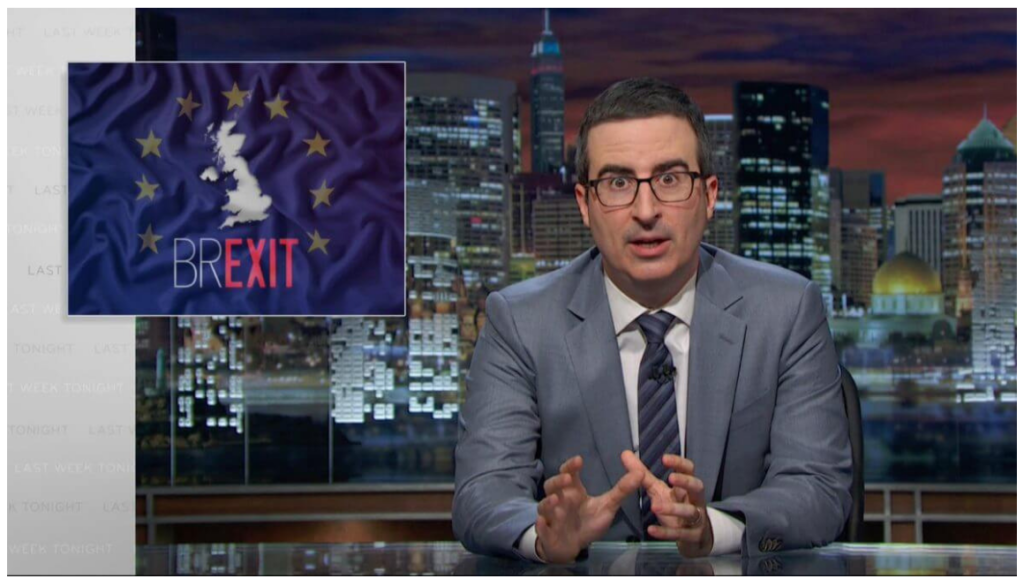The Social Media Revolution: A “Brexit” From Broadcast
John Oliver, host of the show Last Week Tonight on HBO, like many other celebrities, has an opinion on the looming “Brexit” vote. On Thursday, Britain will be holding a referendum on whether or not to leave the European Union (of which it’s been a member for 43 years) and, as with any major political decision, both sides of the issue have been campaigning. The outcome of the vote will effect political policy, immigration and migration, business regulations–– and even the strength of the U.S. dollar.
On the June 19th episode of his show, Oliver spoke for over 15 minutes about all the reasons that a vote to leave the EU would be damaging. Despite being a comedian, Oliver’s reasons were based in fact and delivered in a straightforward manner. Oliver gave a counterpoint to every argument in favor of leaving the EU. He was passionate, strategic and informative…but a significant portion of the UK’s television audience didn’t get the chance to see it as planned.
Due to Ofcom broadcast restrictions that demand television networks remain neutral when covering the referendum and the Brexit vote that would follow, Sky Atlantic decided not to air Oliver’s program on Monday night after Game of Thrones as it normally would. Instead, the network will air the episode on Thursday night at 10:10pm, just after the polls close. Even though the program will be aired at a later date, this is still a significant move. A 2015 study found that two-thirds of adults in the United Kingdom use TV for news. The most-used source of news in general was found to be a TV channel.
Ironically, satirical content is allowed on the UK’s television networks during the restricted time periods. However, although Oliver is a comedian, his delivery was a political opinion based on facts and research and wasn’t delivered as straightforward humor, so it fell under the jurisdiction of the Ofcom restrictions.
The postponement of Oliver’s segment raised an outcry on social media, even though Sky was following very clear rules laid out for them. Since the show didn’t air on television as planned, it’s on social media where the piece has been seen the most–– and it’s thriving there. The video was posted to Youtube less than three days ago, and already has over 5 million views. On Facebook, the number of views also exceeds 5 million and has been shared more than 80,000 times.
This situation is one prime example of the shift from traditional television to social media when it comes to news consumption. Last week, BBC News reported that 28% of the people surveyed in the 18-to-24-year-old age group cited social media as their main news source, 4% higher than those who cited television. Research done by The Reuters Institute for the Study of Journalism research also suggested that 51% of people with online access use social media as a news source.
The way that people are getting their news is changing rapidly, and things like broadcast restrictions and changed airdates aren’t going to silence anyone. Social media is acting as a platform where anyone –celebrity, public figure, business or any Average Joe– can have a voice and reach an audience. The traditional media model’s 24-hour news cycle can’t compete with the instant updates and constantly moving timeline that social media boasts. Especially in times of jam-packed news cycles where information is being restricted, people are going to flock to the channels that aren’t being censored–– with social media at their fingertips, it’s never been easier. It’s one thing to try to preserve neutrality, but when people feel like their access to information is being blocked, they’re not going to hesitate to flock to another source.
Amanda Coyle is an Account Coordinator at Flackable, a national public relations and digital marketing agency supporting the communications needs of registered investment advisors (RIAs) and other forward-thinking financial services firms. To learn more about Flackable, please visit www.mariaa191.sg-host.com. Follow Amanda on Twitter.




